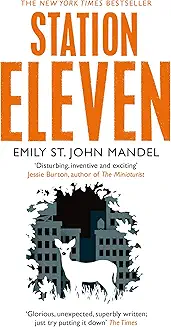‘She’d once met an
old man up near Kindardine who’d sworn that the murdered follow their killers
to the grave, and she was thinking of this as they walked, the idea of dragging
souls across the landscape like cans on a string.’
I’ve been watching a lot of ER recently. Last week I experienced
for the second time the death of Dr Mark Greene. I was reminded just how powerful
the scenes are and how nicely handled it all is. Clever writing and great
production.
As Mark does his best to come to terms with his impending
death, he is also struggling with his relationship with his daughter. When considering
the final piece of advice to pass on before he leaves, he settles on ‘be
generous’. It’s a beautiful moment and a profound offering.
That has all been floating around with me for a while and
was certainly at the back of my mind while I read the most wonderful novel, Station Eleven. It’s a work about a world-changing pandemic written way before
our 2020 experiences that takes us through the build up to the event its consequences.
There’s so much to love and I will not come close to doing
it justice in my own reflections.
The opening is breath-taking. On stage is King Lear, played
by Arthur Leander, who is about to have a heart attack and die. He’s at the
centre of a web of characters through which the story will be told. There’s
Jeevan, a would-be paramedic who leaps upon the stage in an attempt to save his
life; Kirsten, a young girl who appears in the play and whose mother hopes has
a great future in acting; Clark, Arthur’s oldest friend; Miranda, his ex-wife
and the creator of the comic of the title; and Tyler his only child.
After failing in his attempt to save Arthur, Jeevan learns
of the dangers of the Georgia flu. He’s ahead of the game in this respect and
does what most people seem to do in worrying situations – panic buy and seek out those who are most important. The whole
episode is utterly compelling, the tension ever-present, the need to know where
the story will take them all-consuming.
From there we flash backwards and forwards in unexpected
ways. For a while, I was disappointed it didn’t go in the direction I’d hoped,
but I soon realised that what I wanted from this book, and perhaps any novel,
was being provided for in spades and that I just had to trust Emily St John
Mandel with her vision.
I’m not greatly informed when it comes to post-apocalyptic
or dystopian fiction. Even so, I’ve tried to write a bit of it and was pleased
with my efforts. This, however, does what all good work does and steps out of
the genres to encompass everything.
The world of the post-Georgia flu is created in ways that it’s easy
to imagine. What’s makes it stand out so strongly is the journey of each of the
characters. We get to know their history, but more importantly to me, grow to
understand the ways in which they come to terms with their own mortality. A
pandemic is good for one thing and that’s forcing people to reflect upon what
is important. The characters in this novel leave trails for us to follow as we
contemplate our own pasts, presents, futures and demise.
I have a whole list of things I want to focus on now that I’ve
finished. It’s the kind of story that will have you asking and
answering questions throughout. Much as I’d like to list some of my
conclusions, I think that would be foolish. Read the book for yourself and make
decisions of your own. The one I feel it is okay to share is the rekindled
desire to read great fiction – life really is too short to spend too much time
with the chaff.
Station Eleven has a little bit of everything. Profundity.
Poetry. Surrealism. Tension. Heartbreak. Joy. Hope. Humour. Violence. Tenderness. You name
it, I’m sure it’s in there. Not that these things make it dry. This story is alive.
The characters are vivid. Their journeys are immense and I’m glad I sat along
with each of them for the ride, no matter how turbulent each was.
Aces all round for this. My favourite read in quite some
time.

No comments:
Post a Comment